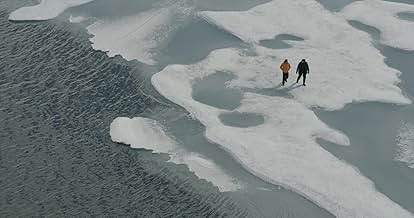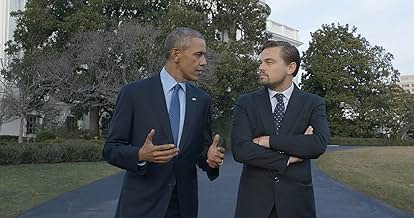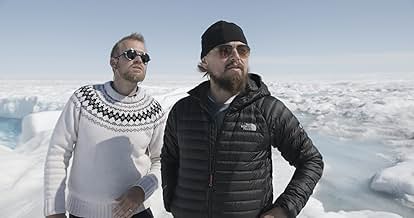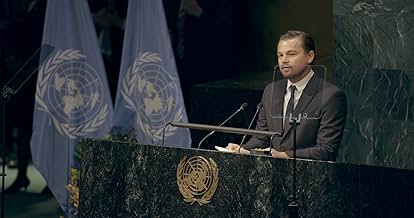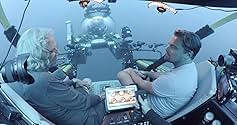IMDb RATING
8.2/10
29K
YOUR RATING
A look at how climate change affects our environment and what society can do to prevent the demise of endangered species, ecosystems and native communities across the planet.A look at how climate change affects our environment and what society can do to prevent the demise of endangered species, ecosystems and native communities across the planet.A look at how climate change affects our environment and what society can do to prevent the demise of endangered species, ecosystems and native communities across the planet.
- Awards
- 2 wins & 8 nominations total
Ban Ki-moon
- Self
- (as Ban Ki-Moon)
Mike Brune
- Self
- (as Michael Brune)
Enric Sala
- Self
- (as Dr. Enric Sala)
Michael E. Mann
- Self
- (as Dr. Michael E. Mann)
Tommy Remengesau
- Self
- (as H.E. Tommy E. Remengesau Jr.)
- Director
- Writer
- All cast & crew
- Production, box office & more at IMDbPro
Featured reviews
A well laid out doc by Leo DiCaprio and Fisher Stevens about the world we are facing today.
From the moment the movie opens we get a little glimpse at Leo's life as he talks about a Bosh painting that his father hung on the top of his crib, that started his passion for environmental issues. From then on, we realize that his documentary is not just for us it was for him as well.
Leo does not try to make himself out as an environmental expert. This is something I admire greatly about the documentary. A lot of us are being influenced on both sides of the argument about the climate change, and when Leo became the UN Ambassador of peace for this topic, he knew he needed to study up on the process, so he did it with Before the Flood. Leo travels all over the world to discover just how bad the problem actually is and what we can do to stop it.
But this doc is all about informing. Leo does not pretend to have the answers by a long shot. One of my fav parts of this movie was a discussion Leo has with an environmentalist from India whose calling out the United States for their part in Global Warming. Leo never defends his home country only comes clean about how realistic or unrealistic it is for America to go clean.
There was this one part of the film where Leo meets with his agricultural guy telling me that America needs to change it's diet. Pretty much telling me that I need to stop buying things like Doritos, which is a small part of a big picture, and by odd coincidence, I just happen to have a big bag of cool ranch in my lap. Granted, it would not hurt my waist line to give up the nachos, but there are other food products that poor Americans like myself would starve if they suddenly disappeared. Proving that this environmental issue for me anyway is not a black and white issue.
Leo created something that does what a documentary is suppose to do. His agenda was to inform you about the climate change and that's what he does, and he does it without having to make anyone look evil (well not too evil anyway). it's all about laying out the facts and seeing what we can do with that info.
Much respect.
From the moment the movie opens we get a little glimpse at Leo's life as he talks about a Bosh painting that his father hung on the top of his crib, that started his passion for environmental issues. From then on, we realize that his documentary is not just for us it was for him as well.
Leo does not try to make himself out as an environmental expert. This is something I admire greatly about the documentary. A lot of us are being influenced on both sides of the argument about the climate change, and when Leo became the UN Ambassador of peace for this topic, he knew he needed to study up on the process, so he did it with Before the Flood. Leo travels all over the world to discover just how bad the problem actually is and what we can do to stop it.
But this doc is all about informing. Leo does not pretend to have the answers by a long shot. One of my fav parts of this movie was a discussion Leo has with an environmentalist from India whose calling out the United States for their part in Global Warming. Leo never defends his home country only comes clean about how realistic or unrealistic it is for America to go clean.
There was this one part of the film where Leo meets with his agricultural guy telling me that America needs to change it's diet. Pretty much telling me that I need to stop buying things like Doritos, which is a small part of a big picture, and by odd coincidence, I just happen to have a big bag of cool ranch in my lap. Granted, it would not hurt my waist line to give up the nachos, but there are other food products that poor Americans like myself would starve if they suddenly disappeared. Proving that this environmental issue for me anyway is not a black and white issue.
Leo created something that does what a documentary is suppose to do. His agenda was to inform you about the climate change and that's what he does, and he does it without having to make anyone look evil (well not too evil anyway). it's all about laying out the facts and seeing what we can do with that info.
Much respect.
I give such an evaluation of the film because of its potency to make people humble and make them think more than usual. Notwithstanding the possibility of pure propaganda in the service of one's interests, any film of this kind can not be deprived of valor because it is showing how important it is protecting nature - our home, and shows us that with our everyday choices and decisions we influence globally to everyone and everything else.
Thanks to movies like this one the stereotypes are becoming more clear. It shows how they are exposed and visible especially for the life in the cities. Instead of paving new paths people prefer to go with the flow. Without improving the consequences of their actions, people do not even think about them. They hardly link the environment and the interests of large corporations.
For the first time the viewer is provided with new data and is shown of the precise consequences that will occur in the earliest stages of global warming. Which, by the way, has already begun. Let's hope that the colonization of Mars will lead to a second leap in human development since the discovery of America and will point the right direction for it.
Perhaps one of the most essential films of DiCaprio. Last but not least, seeing Leonardo playing himself is also an interesting moment of the film.
National Geographic comes as a guarantee of the quality of the film strip which is presenting lots of beautiful natural sceneries.
My blog: http://vihrenmitevmovies.blogspot.bg/
Thanks to movies like this one the stereotypes are becoming more clear. It shows how they are exposed and visible especially for the life in the cities. Instead of paving new paths people prefer to go with the flow. Without improving the consequences of their actions, people do not even think about them. They hardly link the environment and the interests of large corporations.
For the first time the viewer is provided with new data and is shown of the precise consequences that will occur in the earliest stages of global warming. Which, by the way, has already begun. Let's hope that the colonization of Mars will lead to a second leap in human development since the discovery of America and will point the right direction for it.
Perhaps one of the most essential films of DiCaprio. Last but not least, seeing Leonardo playing himself is also an interesting moment of the film.
National Geographic comes as a guarantee of the quality of the film strip which is presenting lots of beautiful natural sceneries.
My blog: http://vihrenmitevmovies.blogspot.bg/
This is an excellent documentary for masses that are either not that familiar with the realities of climate change or don't understand what is at stake or how it works and why.
This was probably the goal of the producers (among them Leonardo Di Caprio or Michael Scorsese) to appeal to a general audience. I must admit I watched it also for that reason. And I see no problem with that! I spare my comment on Leo Di Caprio's activism and work in that field for later as I know many argue that his activism is only his PR and so on...
But, I think the point here is the message of this movie, not the messenger. Visually it is excellent. Leo Di Caprio and all the crew takes us on all the places directly affected by the climate change and show us how the poorest countries on Earth suffer the most of the effects of climate change. They interview not only politicians, leaders and, the pope - but mostly scientists and local people from the most damaged areas. They connect how the oil industry and current energy giants like Exxon, Tepco and so on. lobby in US congress to buy their support and tacit consent, but not dwell too much on it - as if to shift the focus to nature with its stunning cinematography and rather appeal to people on that level, while showing how climate change already f*cked up Poles, forests, and coastal areas and how it's gonna f*ck up a many more areas and shape the politics and economy of the near future.
I also liked that despite his celebrity status Leo Di Caprio (the main interviewer) doesn't fall into false hopes and promises but keeps his mind open and skeptic. Because I think the goal of the movie is to show the reality of the long-term effect and not to wallow too much in short-term steps - like Paris 2015 conference.
Lastly, about Leo Di Caprio. You don't need to like him to enjoy this movie. And you can say whatever you want about his activism, the fact is that on the top of making this documentary, he drives an electric car, and a bike, uses his Facebook almost solely on promoting climate change actions and even spent his time during acceptance of his Oscar for The Revenant to speak about native Americans and climate change. So I don't think this is all just a stunt and PR! Who said that just because you are famous and rich you can't genuinely care and express your activism or can't worry about the planet and the civilization? I think this type of thinking is just another side of the same coin, people who criticize "celebrities" for not speaking out, and people who criticize "celebrities" once they do speak up, are in my opinion much more influenced by the celebrity culture than they think or can admit. It's no win situation when you put people in a mental box.
All in all,you can find some great piece of activism and cinematography in the documentary and I highly recommend for anyone who is ...a human being.
And if you are interested in deeper insights into how this climate change crisis intertwines with politics, corruption, war and economy, go and watch The Shock Doctrine, or have a look on the Zeigeist movie trilogy and The Zeitgeist movement.
This was probably the goal of the producers (among them Leonardo Di Caprio or Michael Scorsese) to appeal to a general audience. I must admit I watched it also for that reason. And I see no problem with that! I spare my comment on Leo Di Caprio's activism and work in that field for later as I know many argue that his activism is only his PR and so on...
But, I think the point here is the message of this movie, not the messenger. Visually it is excellent. Leo Di Caprio and all the crew takes us on all the places directly affected by the climate change and show us how the poorest countries on Earth suffer the most of the effects of climate change. They interview not only politicians, leaders and, the pope - but mostly scientists and local people from the most damaged areas. They connect how the oil industry and current energy giants like Exxon, Tepco and so on. lobby in US congress to buy their support and tacit consent, but not dwell too much on it - as if to shift the focus to nature with its stunning cinematography and rather appeal to people on that level, while showing how climate change already f*cked up Poles, forests, and coastal areas and how it's gonna f*ck up a many more areas and shape the politics and economy of the near future.
I also liked that despite his celebrity status Leo Di Caprio (the main interviewer) doesn't fall into false hopes and promises but keeps his mind open and skeptic. Because I think the goal of the movie is to show the reality of the long-term effect and not to wallow too much in short-term steps - like Paris 2015 conference.
Lastly, about Leo Di Caprio. You don't need to like him to enjoy this movie. And you can say whatever you want about his activism, the fact is that on the top of making this documentary, he drives an electric car, and a bike, uses his Facebook almost solely on promoting climate change actions and even spent his time during acceptance of his Oscar for The Revenant to speak about native Americans and climate change. So I don't think this is all just a stunt and PR! Who said that just because you are famous and rich you can't genuinely care and express your activism or can't worry about the planet and the civilization? I think this type of thinking is just another side of the same coin, people who criticize "celebrities" for not speaking out, and people who criticize "celebrities" once they do speak up, are in my opinion much more influenced by the celebrity culture than they think or can admit. It's no win situation when you put people in a mental box.
All in all,you can find some great piece of activism and cinematography in the documentary and I highly recommend for anyone who is ...a human being.
And if you are interested in deeper insights into how this climate change crisis intertwines with politics, corruption, war and economy, go and watch The Shock Doctrine, or have a look on the Zeigeist movie trilogy and The Zeitgeist movement.
Greetings again from the darkness. Ten years ago Al Gore became a climate-change icon thanks to the Oscar-winning documentary An Convenient Truth (from director Davis Guggenheim). With this updated warning, the climate change crown is passed to Leonardo DiCaprio, and rather than just speak to the topic, he takes us on a worldwide journey to show us the effects.
The film is bookended by DiCaprio's speech to the UN general assembly after he was named UN Messenger of Peace on Climate Change. It's a reminder that the mega movie star has long been an environmental activist and yes, before you scoff, he does acknowledge that his carbon footprint is probably larger than ours (an obvious understatement – unless you also travel by yacht and private jets, and own multiple mansions).
DiCaprio's personal story about Bosch's "The Garden of Earthly Delights" hanging above his crib (seriously, how many parents think this is acceptable artwork for a toddler?) acts as a visual to his message that we are on the path of virtual destruction to the earth that we now know.
The power of celebrity in on full display as DiCaprio scores interviews with such luminaries as UN Secretary General Ban Ki-moon, President Obama, Elon Musk, John Kerry, and even Pope Francis. There is also a clip of his long-ago interview with then President Clinton (Bill, not Hillary). However, it's not the talking heads that have the most impact here. Rather, it's the first-hand look at the Canadian Arctic, the disappearing glaciers of Greenland, the sunny day street flooding in Miami, the destruction of Indonesian Rain Forest to capitalize on the palm oil market, and the eroding coral reefs. The film plays like a Tim Burton Travel Channel series each stop more nightmarish than the previous.
His passion is obvious, though his knowledge less so. DiCaprio understands the power his celebrity brings, and he joins with director Fisher Stevens (known mostly for his acting, but also an Oscar winning director for The Cove, 2009) in this attempt to bring the urgent message to the masses. As they state, we are beyond simply changing lightbulbs, and the key is a shift from fossil fuels to renewable energy a shift that China (not the U.S.) has taken seriously.
With generic solutions like "consume less" and "vote better", the film mostly avoids controversy though it does acknowledge the slick and well-funded 'campaign of denial' by those who profit mightily from a fossil-fuel dependent world. We see an impressive map/video screen tracking ocean currents, temperatures, etc. and there is a chart comparing electricity usage by U.S. citizens vs other countries (we are energy hogs, in case you weren't sure). The ending message hasn't changed much in the past 10 years "It is all up to us".
The film is bookended by DiCaprio's speech to the UN general assembly after he was named UN Messenger of Peace on Climate Change. It's a reminder that the mega movie star has long been an environmental activist and yes, before you scoff, he does acknowledge that his carbon footprint is probably larger than ours (an obvious understatement – unless you also travel by yacht and private jets, and own multiple mansions).
DiCaprio's personal story about Bosch's "The Garden of Earthly Delights" hanging above his crib (seriously, how many parents think this is acceptable artwork for a toddler?) acts as a visual to his message that we are on the path of virtual destruction to the earth that we now know.
The power of celebrity in on full display as DiCaprio scores interviews with such luminaries as UN Secretary General Ban Ki-moon, President Obama, Elon Musk, John Kerry, and even Pope Francis. There is also a clip of his long-ago interview with then President Clinton (Bill, not Hillary). However, it's not the talking heads that have the most impact here. Rather, it's the first-hand look at the Canadian Arctic, the disappearing glaciers of Greenland, the sunny day street flooding in Miami, the destruction of Indonesian Rain Forest to capitalize on the palm oil market, and the eroding coral reefs. The film plays like a Tim Burton Travel Channel series each stop more nightmarish than the previous.
His passion is obvious, though his knowledge less so. DiCaprio understands the power his celebrity brings, and he joins with director Fisher Stevens (known mostly for his acting, but also an Oscar winning director for The Cove, 2009) in this attempt to bring the urgent message to the masses. As they state, we are beyond simply changing lightbulbs, and the key is a shift from fossil fuels to renewable energy a shift that China (not the U.S.) has taken seriously.
With generic solutions like "consume less" and "vote better", the film mostly avoids controversy though it does acknowledge the slick and well-funded 'campaign of denial' by those who profit mightily from a fossil-fuel dependent world. We see an impressive map/video screen tracking ocean currents, temperatures, etc. and there is a chart comparing electricity usage by U.S. citizens vs other countries (we are energy hogs, in case you weren't sure). The ending message hasn't changed much in the past 10 years "It is all up to us".
In the end, it's not about who pollutes more or less, we all have to make a personal change of lifestyle and mindset. I know i'm no where close to an ideal amount of consumption, but I want to try just a little harder to be more mindful of what I put into the environment and become a better steward of our beautiful planet and people. Great film. Very serious tones and messages throughout, but anything short of serious wouldn't make any real change, in my opinion. Being able to see some of the various examples of how fossil fuel, coal, and energy consumption negatively effects the environment reinforced the core messages very well. There was quite a lot of focus on DiCaprio in both face time with the cameras and the spotlight of the work that he has been doing in this field, but it is overshadowed by the bigger picture, which is addressing the problem that climate change poses on humanity and actually taking action.
Did you know
- TriviaReleased for free on the National Geographic YouTube channel.
- Quotes
Leonardo DiCaprio: You are the last best hope of Earth. We ask you to protect it or we, and all living things we cherish, are history.
- ConnectionsFeatured in Docventures: Ilmastonmuutos (2017)
- SoundtracksBefore the Flood
Composed by Trent Reznor & Atticus Ross, with Gustavo Santaolalla
- How long is Before the Flood?Powered by Alexa
Details
Box office
- Gross worldwide
- $988
- Runtime1 hour 36 minutes
- Color
Contribute to this page
Suggest an edit or add missing content


